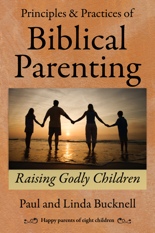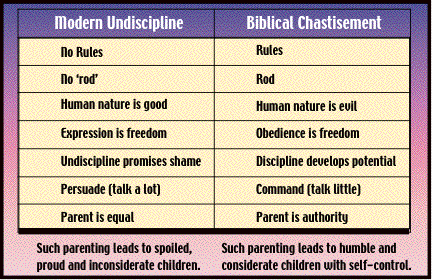
Click for information |
Principles and Practices of Biblical Parenting– Raising Godly Children –Paul and Linda Bucknell |
Lesson #7
Discipline: Loving Use of the Rod
Purpose: Develop a scriptural perspective of chastisement and discipline by describing ways to properly administer the rod to our children. |
A.) Understanding Discipline |
Society used to treat the parent who did not spank or discipline his child as an unfit parent. Today, modern philosophy has so influenced our society that those who spank their children are portrayed as the unloving, mean, unfit parent. Indeed, things have greatly changed! Is there still a place for chastisement? And if so, why?
God's Word very clearly addresses the importance and practice of discipline. The Bible has so much to say that our main job will be to condense its many teachings into one lesson. Seventeen verses in Proverbs alone use the word discipline. Chastisement is taught as crucial to raising a wise child. Hebrews 12 has a comprehensive section on chastisement.
Part 1 provided several key concepts to correct our children. Those concepts gave us the right foundation to know how to use chastisement wisely. Our end goal is to produce children that love and respect God and others. We accomplish these goals by teaching our children respect us as parents. We continually build close relationships with them. We need to remove all the things that become barriers between us in order to imitate our heavenly Father who exercises both His authority and love. Using the rod is essential in obtaining these goals.
The rod is just one part of the correction process. It is not the whole process. The switch, rod or straight stick is a very handy tool to accomplish some special tasks that must be done in our children. First, we will look at what the scriptures say about this topic and then focus on some practical questions about this issue.
Chastisement is the proof of a parent's love for his/her child.
A. Understanding Discipline
As we begin, let's look at a few definitions of some important terms in the context of parenting. We admit that part of the confusion is because people have different understandings of the same terms. Even here the terms will overlap.
Instruction: Instruction is the verbal and sometimes physical persuasion used to urge a child to follow some course of action. Discipline: Discipline is the whole training process by which you bring a child to obedient action. Chastisement: Chastisement (or use of the rod) refers to the physical pain or discomfort that is inflicted to bring the child to an acceptable standard and change of behavior. ie: spanking, switching Disciplines: Disciplines as a noun describes a structure of behavior such as controlling time, eating or other good habits. "He is has good disciplines." |
The context helps us better understand what another person is trying to communicate. For the purposes of this article, we will use chastisement to focus on the physical pain inflicted upon a child during correction and discipline as the whole training process which of course includes the use of the rod. 
Take a look at our new book, Principles and Practices of Biblical Parenting: Raising Godly Children. Check out the BFF Resource Center for this book and many other helpful and relevant resources (308 pages).
Great for a Parenting Class!
Perfect for individual study!
You can purchase our parenting, marriage and other articles, handouts, videos at our store!
Ephesians 6:4 is one key Bible passage which helps us get a better grasp of what God is saying to us parents. The apostle could have told the fathers many things on bringing up their children. He points out one negative command and two positive commands.
And, fathers, do not provoke your children to anger; but bring them up in the discipline and instruction of the Lord.
The father should responsibly care (literally nurture) for his child in two ways: through discipline and instruction of the Lord. We might picture these two things as guardrails which keep a car from falling off a narrow mountain road.
 One time our family was traveling by bus on the famous Cross Island Highway over the beautiful mountains in the middle of Taiwan. The roads are so narrow that at times the buses cannot pass each other. Sometimes they wait for the other to pass, but at times they squeeze by each other for there is no way to back up.
One time our family was traveling by bus on the famous Cross Island Highway over the beautiful mountains in the middle of Taiwan. The roads are so narrow that at times the buses cannot pass each other. Sometimes they wait for the other to pass, but at times they squeeze by each other for there is no way to back up. 
We were in the bus that was on the cliff side. In order to pass, we rubbed against the guardrail that was at the edge of the road as we inched along. The bus was making a loud screeching noise, but more importantly, we could not see where the bottom was out the window. Everyone on the bus naturally leaned away from the cliff. We did not like rubbing against the guardrail, but it was much better than not having it there! It made it difficult for us to go beyond its edge. This is what discipline and instruction do for the child. They keep the child on the right pathway.
Installing the guardrail on the edge of a mountain cliff took a lot of work. Men lost their lives in the building of that important highway. Is it worth having the guardrails? Of course it is. There is no sense having a mountain road without a barrier. Nor does it make any sense to have children if we are not going to put these two barriers up to protect them.
The two Greek words used here are very instructive. 'Discipline' (paideia) refers to the whole method of training a child. That would include chastisement as well as education. The English word 'training' is similar to this if we added the idea of chastisement to it. 'Instruction' (nouthesia) means to counsel, advise and warn. Words are used to build up, direct and encourage the children.
 To Suppress improper desires
To Suppress improper desires
Both of the words imply the child's lack of ability to order his own way. Without these guards implemented by the father, the child will go off the road and down the steep cliff. We see children falling off all the time. Why do children need this help?
On the one hand is a mere lack of knowledge. The parent needs to teach what is right and wrong. This instruction, though, does not come easily at times. There seems to be something that holds back or twists the learning process.
The other problem explains this. Children have a natural resistance to obey. All parents have faced this in their child. The sinful nature is rebellious toward authority and intent on fulfilling its own desires without consideration for other people. No one would complain about a person's desire to eat, but if a hungry man entered a restaurant, sat down, grabbed another person's plate and started to eat, this would be intolerable. A child must be trained to think about the needs of others and be willing to deprive himself for the sake of doing what is proper.
The guidelines for the different situations will be worked out more clearly in a following lesson. These boundaries are mostly derived from general principles that are specifically applied to the situations one is confronting.
|
Discipline and instruction in the Lord are needed to provide the training that the child needs to learn how to be 'other-focused.' They need to know how to suppress the urge to satisfy their own desires. The rod works wonders by using pain to cause the child to restrain himself from expressing the desires that might offend another, i.e.: taking a toy that belongs to his friend. The instruction not only guides the child but as he gets older helps him adopt these principles for himself. This is the goal for instilling self-control in our child.
We used to have a neighbor child who would take whatever toy he wanted. The neighbors were not happy with this child! He seemed oblivious to the inconvenience and consternation of others.
To implant the right behavior
Discipline (training) and instruction have a common purpose. The guardrail's purpose was to safely keep the cars on the road. Improper use of chastisement occurs when the parent is only trying to keep the child out of danger rather than positively focusing the child. In many cases, a parent only disciplines a child when his child made a neighbor angry or when he greatly disturbs the parent. This is clearly not sufficient for training purposes.
The child in these cases will be confused about what is acceptable. He might generally play loudly with his friends, but one day his father spanked him for doing what he always did. The only difference was that the father had a bad headache and could not rest. The child was not sure where the 'guardrail' is. It might as well be in the center of the road. This is the way to exasperate a child and push him into anger.
Discipline's real goal is to enable, guide, confirm and help. The motivation behind the use of the rod should be love rather than the selfish inclination of the parent.
Chastisement helps develop respect for authorities and self-control so that the children can reach their full potential as human beings. Without this discipline, the child's poor attitudes about life and his lack of ability to control his body will cause him to be a victim to his own evil tendencies. Our children have enough problems in life without their parents adding to them.
Pause for Reflection: How did your own father do? Did he carry out both discipline and instruction? Are you doing better than your own father? Explain.
B. A Scriptural Perspective of Chastisement from Hebrews 12
![]() Our Wise Creator obviously knew the need parents have to be very clear on the various aspects of discipline. Hebrews 12 summarizes much of what has been said in numerous other passages. Let us draw nine principles from the text and see how it applies to the use of chastising our child.
Our Wise Creator obviously knew the need parents have to be very clear on the various aspects of discipline. Hebrews 12 summarizes much of what has been said in numerous other passages. Let us draw nine principles from the text and see how it applies to the use of chastising our child.
The author compares our Heavenly Father's discipline of His children with the way an earthly father does. He taught from what was familiar (chastisement in the home) with what was more difficult to understand (God's ways). To be honest, our in our situations, many of us have to learn from God's ways and apply it to our own homes. Our societies are in great decay.
 The Right Motive of Disicpline (12:5-6)
The Right Motive of Disicpline (12:5-6)
Love is the motivation of true discipline.
"And you have forgotten the exhortation which is addressed to you as sons, "MY SON, DO NOT REGARD LIGHTLY THE DISCIPLINE OF THE LORD, NOR FAINT WHEN YOU ARE REPROVED BY HIM; FOR THOSE WHOM THE LORD LOVES HE DISCIPLINES"" (Hebrews 12:6)
God does not let His children wander away. He gives them special care to keep them on the right track. Just as God disciplines His children, so a father is expected to chastise his children. The love of the father compels him to use the rod on the child. Discipline is rigorous work. One needs to stay on top of things. The faithful father does this because of his love for that child. Isn't it sad to see a child acting without self-control?!
Pause for Reflection: Why do you chastise your child?
 Pain's Reward (12:6)
Pain's Reward (12:6)
If it doesn't hurt, it doesn't work.
AND HE SCOURGES EVERY SON WHOM HE RECEIVES." (Hebrews 12:6)
We don't pretend that certain aspects of discipline don't hurt. In fact, the word 'scourge' is very strong and indicates that at times, chastisement needs to be very painful to accomplish its goals.
Do not hold back discipline from the child, although you beat him with the rod, he will not die. (Proverbs 23:13)
Although parents might feel that they are 'damaging' their child, chastisement brings about a greater good that could not otherwise be accomplished. The scriptures do not deny that the child will suffer if chastised, but only that it is temporary and he will not die. The scriptures do repeatedly acknowledge that the child will suffer without chastisement.
Some people avoid pain and conflict at all costs.These people will not be able to care for their children. The child must experience the pain associated with chastising to be properly trained. God has to train parents too!
Those who train for the marathon severely discipline their bodies. Their bodies ache and groan. And all for only a race or competition. This modern generation doesn't object to self-inflicted training. They object to the enforcement of one person's will upon another.
 A Special Belonging (12:7)
A Special Belonging (12:7)
God chastises only His own children.
It is for discipline that you endure; God deals with you as with sons; for what son is there whom his father does not discipline? (Hebrews 12:7)
Notice how the father is expected to discipline his child. Every father disciplined his sons. This includes the sense of chastisement. If the father neglected this duty, it would show that something is tragically wrong. We should unquestionably discipline our children.
Pause for Reflection: You do chastise your child, don't you?
 Abandoned & Lonely (12:8)
Abandoned & Lonely (12:8)
Children desperately need their parents' discipline.
But if you are without discipline, of which all have become partakers, then you are illegitimate children and not sons. (Hebrews 12:8)
If a child is not disciplined, then it shows that he is not part of the family. Ownership brings a sense of responsibility. The lack of discipline proves a lack of ownership. We understand that there are children that have parents that do not discipline them. This family is dysfunctional.
The special treatment in discipline, perhaps, is the basis of security and belonging. Otherwise, the child senses he is unimportant. Is this perhaps the basis of the self-esteem crisis today? Parents are not disciplining their children. The children then do not feel valued or treasured.
Pause for Reflection: Do you worry about your child's self-esteem? Some parents make it more difficult by thinking that spanking the child increases the lack of self-esteem. The scriptures say the opposite. A child cannot grow with a healthy appreciation of self and others unless they are loved and chastised.

 Fatherly Respect (12:9)
Fatherly Respect (12:9)
Here is the clear connection between discipline and respect.
Furthermore, we had earthly fathers to discipline us, and we respected them; shall we not much rather be subject to the Father of spirits, and live? (Hebrews 12:9)
When earthly fathers discipline their children, those children come to respect them. God the Father disciplines His children to create that same respect for Himself. The need for a child to respect his father is important. The means of getting this respect is also clear. Why do so many people frown on it then?
 A Higher Purpose (12:10)
A Higher Purpose (12:10)
God's higher purpose for us makes discipline ethical and necessary
For they disciplined us for a short time as seemed best to them, but He disciplines us for our good, that we may share His holiness. (Hebrews 12:10)
For bodily discipline is only of little profit, but godliness is profitable for all things, since it holds promise for the present life and also for the life to come. (1 Timothy 4:8)
Fathers discipline their children. God the Father disciplines His children. They do it for a greater purpose. They look beyond the scene to the future. The result from the training makes it worth it all. The athlete looks at the result of the training–to win the prize. So must the parent. He is training for godliness.
 Good Results (12:11)
Good Results (12:11)
Discipline is hard work. Is it really worth it?
All discipline for the moment seems not to be joyful, but sorrowful; yet to those who have been trained by it, afterwards it yields the peaceful fruit of righteousness. (Hebrews 12:11)
Yes. We all know about the suffering moments, both parent and child. No one likes it. When one sees the result in a well-trained child, everyone is delightfully surprised. The scriptures describe it as 'peaceful fruit of righteousness.' This is our goal. This justifies the pain.
 Steady Forward (12:12)
Steady Forward (12:12)
We need to understand the purpose of discipline and thus be encouraged.
Therefore, strengthen the hands that are weak and the knees that are feeble (Hebrews 12:12)
Children often get bitter at parents who just spank them. These children know through other situations that the parents don't really care for them. There is no greater goal in mind. In some cases the parent does the same thing for which the child is getting chastised for! We should share our higher purpose with our children. Put the goal out in front of them so that they will know that this stage will pass. Keep the children going.
 Clear Boundaries (12:13)
Clear Boundaries (12:13)
Only by staying on the right path can the child be protected. Encourage the child to stay in the right paths.
And make straight paths for your feet, so that the limb which is lame may not be put out of joint, but rather be healed. (Hebrews 12:13)
Keep the pathway very clear in front of them. Talk over with your child what is expected. If they are being inattentive when talking with them, look at them in the face. If they claim they forget, then have them repeat the instructions after you tell them.
Summary: Hebrews 12 summarizes much discussion on the importance and responsibility of the father to carry out discipline in his home. Let's turn now to some practical considerations when we implement what the scriptures command parents to do.
C. The Practical side of Chastisement
 Below are a number of common questions parents have about chastisement.
Below are a number of common questions parents have about chastisement.
Is chastisement child abuse?
Chastisement is part of the training program and is not at all abusive in nature. Abuse occurs when the parent waits to deal with the child after he is angry and irritated with the child. He should first calm down. A parent's personal struggle will sometime show up in the reckless treatment of their child. The influence of drugs like alcohol accentuate the problem. This is not discipline.
As mentioned above, 'abuse' also occurs when the parent neglects chastisement altogether. During this process, the parents' slowly store up anger until they lash out at their child. We should not call this discipline either because there is no purposed structuring of their life (refer to the Greek word above).
Without chastisement no child can easily succeed in life without being wounded.
What can I do about worried neighbors?
Chastisement can be noisy! Neighbors sometimes get concerned when they hear your child screaming. They do not see your caring love nor your long-term plan.
It is essential that you start training your child when he is a baby. This will enable you to gain the child's respect your 'no' very early This will not eliminate the need for chastisement, but it will greatly limit it.
We have trained our children, especially the loud criers, to cover their mouths when they cry. It works! We also do not tolerate extreme crying or yelling. Yelling is an expression of rebellion. The child must be warned of it and, if necessary, also be chastised for his disobedience. Listen carefully to your child's cries to discern the differences.
Choose to discipline in private places that absorb sound. If you live in apartments, flats or condos, choose the room away from the halls and with more insulation like a rug. You might cover an air vent for the brief moment. Walk-in closets are great.
When parents discipline their children in anger, they create hostile children. The parent shouts, and the child shouts back. The parent hits; the child yells. This is not is desired.
What should I do about my anger?
The parent will sometimes get angry at a child's behavior. It will produce in the parent an urge to chastise the child. The problem is that if the parent himself does not have self-control, he will tend to yell and hit harder than he should. If you get angry, first quiet yourself down. While quieting down, have your child wait in the other room. Explain that you are angry but want to properly discipline him. He will much appreciate your gesture!
Should we discipline our child in public?
No. It is inappropriate. Tell your child that he will be disciplined when he gets home. If you are returning to an apartment at night or it is a long way home, discipline him in the car. Straighten everything out so he can have an easy bed time routine.
Sometimes the child's attitude is bad. Without correction, you realize more trouble is coming. Take him to a private placeand discipline him. Sometimes it is helpful to take the child for a walk and hold his hand tightly so that it hurts.
If at worship, we first warn and then start lifting fingers. One finger means one strike upon returning home.
Are we doing anything illegal?
Some legal authorities frown on spankings and chastisements. They do not understand the issue. Those with modern mindsets have spread their philosophy, and the governments pay them money to do it. Local statutes differ. However, this is a moral issue. A biblical principle is at stake. It is one I would go to jail for if necessary.If chastisement is a clear sign of love, then I must so love my children.
More often than not, though, if we explain our ways and overall purposes, people will see the difference between our training methods and beating. The authorities have real problems with parents that beat their children. They don't even have time and personnel to deal with these. They hardly want to care for cases in which the children are being loved and cared for!
Beatings differ from chastisement like night from day. Chastisement is not punishment or revenge, but a way of inculcating right judgment and respect. If you live near a neighbor who likes reporting people, you might consider moving. People hear the crying and can't discern the difference.
What should I tell my child when chastising him?
Before the whole incident ever had happened, the parents should have already told the child what the rules (boundaries) are and the consequences for breaking them. With this instruction in place, chastisement can follow.
The parent does not stand opposed to the child as if he was an enemy. Having placed the rule before him, the child is better able to focus on the boundary that he crossed and his own unwillingness to comply. We want him to think, "I don't want to do this again!" The parent is the enforcer. The parent might say, "I don't like doing this, but it is for your own good. You know what happens when you ... ." The child is responsible for his actions and attitudes. Chastisement enables him to clearly observe the problems that happen when he acts irresponsibly.
We need to first certify what he has done wrong and then chastise him. We should encourage the child first to state what he had done wrong, even if you witnessed it. We want to encourage confession. Have him clearly tell what wrong he did. If he needs help, you might say, "Didn't you agree that you were not to ?" Now I have to use the rod."
We might also think about restricting some freedom. For example, our child was running around the church building during meal time against our rules. We made him sit down for the whole meal time the following Sunday. We explained what we were doing and why.
What about time-out?
The parent has many different ways of correcting our child, but rebuke and using the rod are the two basic. In many cases, talking to our children simply does not change their attitudes. Nothing can completely replace the biblical injunction to use a rod. Chastisement is not the only way to correct a child who has done wrong, but it is the only way to gain missing respect. Proper use of the rod cleanses the child's guilt of wrongdoing and restores his respect for the parent. Then comes immediate and full reconciliation–just like it never happened.
Other methods like time-out are ineffective. Many methods fail completely because they do not restore the relationship or the parent is trying to avoid using the rod. Chastisement is necessary to chase away the foolish and rebellious heart of the child. We can use other tactics like restriction of liberties, rebuking, distraction, and other things to work in conjunction with using the rod.
What is a rod?
The rod is a little branch of a tree, sometimes called a switch. Rulers break. They cost money. Switches have a nice swoosh sound. One can use it softly with a tinge of pain or rather strongly, depending on the situation. Get a switch that bends easily not an old hardened or heavy one. Using plastic tubing does the same job.
How do you properly use the rod?
The rod is used for training as well as chastisement. When used for training, the switch helps make the child properly respond to the parent's 'no.' Once the child makes the connection, the child will need much less chastisement. The initial fear is instilled in the child. In training, the rod is used immediately, but ever so softly with the tiny child. They are not usually being rebellious but just ignorant at what the parent wants. At 10 months our daughter would quite consistently listen to our 'no' (if she wasn't distracted).
The most effective training takes place immediately following the offense.
In chastisement, the rod is used to inflict pain upon the child because he has clearly been disobedient. In these cases it is used for rebellion. There are two kinds of rebellion. 1) Open rebellion is when bad attitudes accompany disobedience. 2) Silent rebellion occurs when they only show their rebellion by their disobedient behavior.
Do children sometimes forget? Yes, but more often than not it is a cover up for their rebellion. Children sometimes do become forgetful, distracted, etc. We do not switch them for this. Instead, we should just warn them. But when we know they have clearly disobeyed us, we must use the rod. 
In these cases, the rod can be struck against the backs of hands. Tell the child to place his hands down on a flat surface. The pain is equally distributed across the hand rather than focusing in on one spot. Spanking through thick pants is hard because one might not get a good spank in. In some cases one might overcompensate for the thickness of the pants and be too hard.
Remember, when using the rod for the first time, make sure you try it out on yourself first! This way you can better judge the pain. One does not need to be overbearing.
Can we warn them first?
In some situations where the command is unclear, warnings are quite appropriate. For example, we might instruct our child not to go into a neighbor's yard. But because the children are used to visiting that neighbor's yard for over a year, we can first warn and remind them for a day or two. Then announce at a given time when you will implement the rod. In fact, you have already been training them not to go there.
In many cases, we want to warn our child when he has clearly gone against his conscience and our rules. Only the rod will help him get back in proper relationship to his parents.
What about first-time obedience?
First-time obedience is when the child obeys the parent the first time they request something. In many cases, the parents warn their child again and again. They actually fool themselves by thinking they are helping the child by being tender. Instead they are confusing the child and will end up using the rod more than they would with first-time obedience.
Certainly, we should strive for first-time obedience. First-time obedience is obedience. Second-time obedience is disobedience. Let us think about this a bit more.
Once the parents warn the child, the child becomes accommodating to this warning. In other words, the child is no longer responding to the parent's instruction to do something. They have learned that the parent will not take action until she starts raising her voice – probably after the third instruction. Why go through this process? It causes great friction in the relationship with the child.
How do I train my child to first-time obedience?
First, we should explain the change we are going to make to the children that are old enough to understand. Tell them what you were doing was not right or fair to them. Certainly not best. Accept responsibility. Apologize and tell them the plan.
It would be best to start off by training. They have been trained wrongly. Now they have to be retrained. Set up some practice situations where they can learn. Make it like a game (if they are young). Tell them, for example, to stand across the room. When you say, "Come," they are to come right away. You can set up a number of such situations. Since this is retraining, do not take their disobedience to be rebellion, at least at first. Remind them. Set a time when the switch will start being used for not coming or doing what is expected upon the parent's first request.
Remind them early in the morning the new way of doing things. Remind them at noon. Congratulate them for success. Explain how much better it is. For example, mommy doesn't get upset and yell. The parent will need to keep a small rod with them to be able to instantly carry out any disobedience. The retraining is difficult but necessary.
Why is it that many pamphlets discourage chastisement?
At the heart of modern thinking, is the belief that man on his own without laws and restrictions is the most natural and therefore free and happy. They think freedom requires the elimination of restraints so that they can express their feelings and satisfy their desires. This modern mindset doesn't really believe in discipline, the shaping of the child. They do not like setting up boundaries and will instead use persuasion. They do not want to interfere with the child's freedom of choice. They believe the child can rightly discern issues. They miss the point.
The Biblical perspective is the opposite. The Bible affirms that only by restraining ones desires to please self, can that person reach the full potential he was designed for: loving God and others. The Bible clearly affirms that the child without chastisement is foolish. The Bible means that this person lives according to his desires rather than by principles and wisdom. He chooses what is easiest rather than what is best.
It is these perspectives that have shaped many a modern society and is leading them into chaos. The government is cultivating disrespect for authorities that will in the end lead to rejection of the government itself.
The Problem of Low Self-Esteem
The child without discipline is the one which does not develop properly. Though the professionals emphasize that correction hurts a child, the scriptures speak to the contrary. When a child does not receive discipline then he or she is treated as a non-son or non-daughter. They do not think of themselves as different from any other child, as far as their parents are concerned. They are not special or prized. He believes his parents do not care for him (this is true though difficult to accept). Because of this emotional estrangement, great insecurity develops in that child.
Chastisement results in healthy children. The withdrawal of it brings emotionally scarred children for which we have ample evidence. Just compare the children who have received discipline and the ones that have not. Or do a study on American society before 1960s and afterwards.
Pause for Reflection: Do you share any of the modern mindset that needs to be conformed to God's Word?
What about spanking with the hand or using the rod?
Some are very opposed to any use of the hand. We suggest that one uses the rod but the hand is made to be 'handy.' In other words, sometimes you will not find a switch around. (Maybe the children have hidden them! This has happened with us. We recently renewed our supply with the pruning of the apple trees.) We always have a hand.
Who is responsible to chastise the child, Dad or Mom?
God clearly sets the father in charge over the family. The fathers need to be responsible for the overall disciplining of their children. God, however, has called Mothers to be Dad's top assistant. She must carry out discipline through the day to be constant and effective.
At times, mothers get too emotionally involved in the child's feelings. If a father sees this, he should step in and finish carrying out the chastisement.
Conclusion
Many parents today have a very poor understanding of how to parent the child. The rules are easy to learn but it is much more difficult to convince the mind. Many parents unintentionally have committed themselves to the destructive modern mentality. Even though every situation around you confirms the foolishness of this modern approach, parents keep on going. Or perhaps worse, they think they find a happy medium.
If a parent has a problem with chastisement, then he also has a problem with God. Because of God's close relationship with His people, He chastises them. This displays His interest in our well-being.
Thus you are to know in your heart that the LORD your God was disciplining you just as a man disciplines his son. Therefore, you shall keep the commandments of the LORD your God, to walk in His ways and to fear Him. (Deuteronomy 8:5-6)
As parents we need to learn from God our Father how to discipline. If our children mean anything to us, then we need to consistently follow through. Start early with training. Develop respect for the parents so that the child will do as they are told the first time they are told something. Chastise them as necessary. Keep in mind the overall plan of producing children that will love God and others.
If you are faithful, God is faithful. You will have children that not only you love but others love. You will want to be near them. They will want to be near us. After all, this is the first fruit of our training–a wonderful relationship with our children.
Parenting Principles
- Chastisement is the bringing of pain to a child to bring him to compliance from the heart.
- A father is responsible for the overall process of training the child.
- Using the rod is a crucial part to bringing up godly children.
- We need to keep the boundaries (rules) and consequences clear before chastising.
- We should not chastise in public.
- After chastising a child, a parent should lovingly talk with the child.
info@foundationsforfreedom.net
Scriptures typically quoted from the New American Standard Bible unless noted: (C) Copyright The Lockman Foundation 1988












